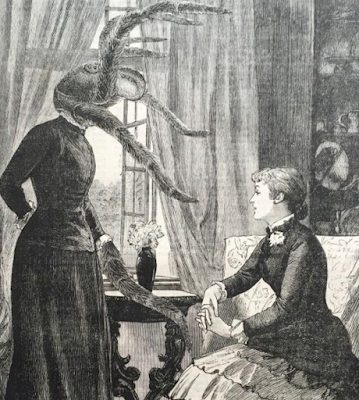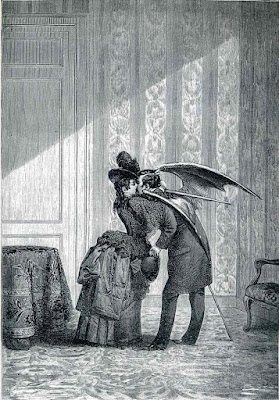We know that rolling ability tests or skill checks for social situations is an ill-considered way to resolve social situations because it stops players from thinking—it turns a strategic challenge into a dice roll.
That being said, having no procedure for dealing with social challenges could lead to a lot of circuitous and time-consuming back-and-forthing between the players and the DM until it is decided that the situation is resolved either favorably or unfavorably for the players. Relying on DM fiat is fine in a lot of circumstances but too much can lead to decisions that feel arbitrary—the DM either lets the players do what they want, in which case they can feel like they are getting away with something, or not, in which case they can feel like the DM is being hard and punitive.
The reaction roll does a good job of providing a simple mechanic for social challenges. The offer refused+lowered standing/offer refused/unsure/offer accepted/offer accepted+added benefit dynamic complements the 2d6 probability spread well.
But what about the actual challenge?
The obvious answer: PCs should to be able to do something gain additional bonuses to the roll. What Arnold K. brought up some months back in his post on parleying can be applied to all forms of social interaction where the desires of the PCs and the NPCs are different. Adding a goal, value, or motivation to an otherwise one-note NPC not only makes the world seem more vivid etc. but more importantly gives the character something the PCs can latch on to and use in negotiation.
I'd only want to do this if the players are going to want something from an NPC that they are not necessarily willing to offer. You don't want to add texture to every NPC for the same reason you wouldn't want every supporting character in a book or movie to have a full backstory and character arc—it adds a lot of extraneous detail that pulls focus away the important parts.
The game turns into a playacting slogathon if every pre-dungeon supply run involves stilted RP with a shopkeeper. Feeling like you need to fully roleplay every conversation the PCs have is a mistake a lot of newer DMs run into, but really you only need to zoom in on the things that actually provide engaging gameplay.
If, for example, the PCs have a fake gem or conspicuous stolen art piece they are trying to dupe someone into buying, considering the identity of the NPC and what they value suddenly becomes more important. Are they religious, and thus more willing to trust people of similar faith? Do they like to drink perhaps a bit too much, and thus inclined to be genial with someone who takes them out for a beer? Instead of just having a flat chance of the object getting identified, there is now a way for the players to strategize a method of maximizing their chances for the shopkeeper in question to agree to buy the thing.
Of course, these features would need to be telegraphed. The shopkeeper has to be seen displaying a holy symbol or acting a bit buzzed before the players can know how to game them.
This is the kernel of a social challenge: the PCs want something from an NPC; the NPC in the way of what they want has a discernible characteristic, and it's up to the players to identify and exploit that characteristic to gain the NPC's favor. Bonuses to the reaction roll could range from +1 to +3 depending on how much the players invest into their efforts.
Brainstorming a couple NPC values + ways to telegraph them:
1. Romance. Flirts unabashedly with the prettiest member of the party.
2. Kindness. Mopey and dejected. Perks up at the slightest compliment.
3. Booze. Heavy eyelids, slurred speech, periodically pulls from a flask.
4. Faith. Casually recites lines of scripture. Wears a holy symbol and/or has one prominently displayed somewhere.
5. Flattery. Loud and boastful. Demands to be called "sir" or "madam" or by some other official-sounding title.
6. Status. Snooty social climber. Gaudy clothes, always gossiping, directs attention to the most important-seeming person in the room.
7. Company. Quiet and sullen at first, but will launch into an animated conversation at first opportunity.
8. Niche interest. Conspicuously displays their fixation (garish hats, porcelain dolls, painted tortoises, etc.).
9. Process. Surrounded by piles of forms and paperwork; constantly refers to various rules and regulations; fervent adherence to the strictures of exhaustive bureaucracy.
10. Relief. Currently burdened by some misfortune like a stolen heirloom, sullied reputation, blood feud, weird curse, etc. made obvious to the PCs.
Obviously not an exhaustive list. The point is to give something the players can see that makes them think "hmm maybe that's something we can exploit."
These sorts of desires/values can stay general or become really specific as the situation demands. More challenging social challenges would necessitate more specific values. Perhaps the only thing the high slayer of the headsman's guild values more than duty is his beloved golden python he keeps as a pet, hidden somewhere in his watchtower lair. Good luck figuring that one out.
This post from Was It Likely? provides another great option (by way of this post from To Distant Lands) for creating NPCs with motives and desires that have fuck-all to do with the PCs. Allow them to permeate and enrich your mental ecosystem.



